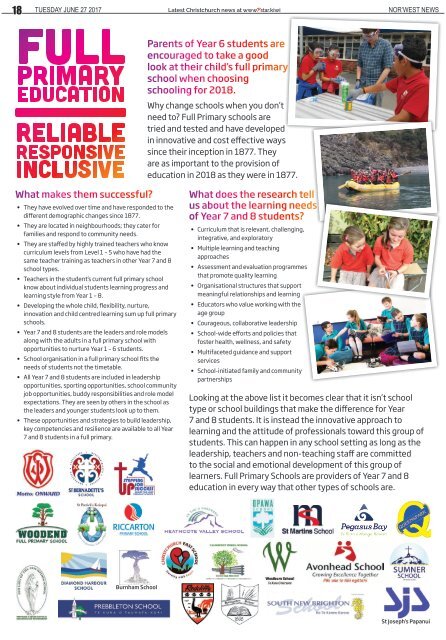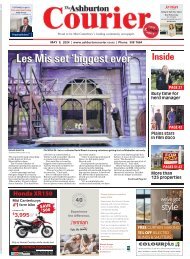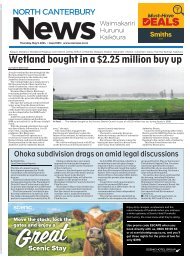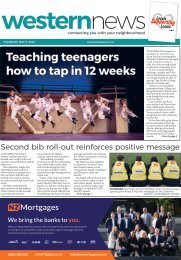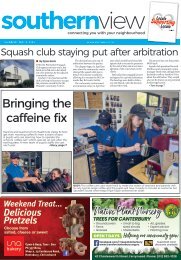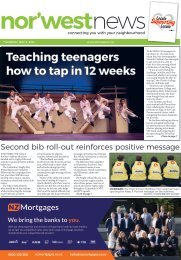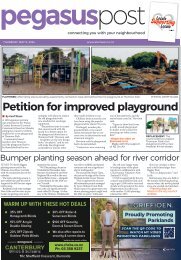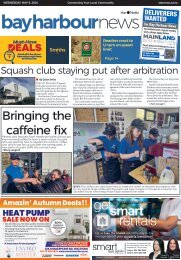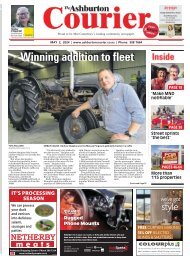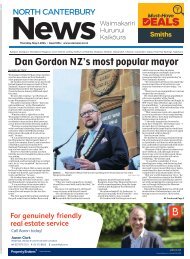Nor'West News: June 27, 2017
Create successful ePaper yourself
Turn your PDF publications into a flip-book with our unique Google optimized e-Paper software.
18 Tuesday <strong>June</strong> <strong>27</strong> <strong>2017</strong><br />
Latest Christchurch news at www. .kiwi<br />
NOR’WEST NEWS<br />
Parents of Year 6 students are<br />
encouraged to take a good<br />
look at their child’s full primary<br />
school when choosing<br />
schooling for 2018.<br />
Why change schools when you don’t<br />
need to? Full Primary schools are<br />
tried and tested and have developed<br />
in innovative and cost effective ways<br />
since their inception in 1877. They<br />
are as important to the provision of<br />
education in 2018 as they were in 1877.<br />
What makes them successful?<br />
• They have evolved over time and have responded to the<br />
different demographic changes since 1877.<br />
• They are located in neighbourhoods; they cater for<br />
families and respond to community needs.<br />
• They are staffed by highly trained teachers who know<br />
curriculum levels from Level 1 – 5 who have had the<br />
same teacher training as teachers in other Year 7 and 8<br />
school types.<br />
• Teachers in the student’s current full primary school<br />
know about individual students learning progress and<br />
learning style from Year 1 – 8.<br />
• Developing the whole child, flexibility, nurture,<br />
innovation and child centred learning sum up full primary<br />
schools.<br />
• Year 7 and 8 students are the leaders and role models<br />
along with the adults in a full primary school with<br />
opportunities to nurture Year 1 – 6 students.<br />
• School organisation in a full primary school fits the<br />
needs of students not the timetable.<br />
• All Year 7 and 8 students are included in leadership<br />
opportunities, sporting opportunities, school community<br />
job opportunities, buddy responsibilities and role model<br />
expectations. They are seen by others in the school as<br />
the leaders and younger students look up to them.<br />
• These opportunities and strategies to build leadership,<br />
key competencies and resilience are available to all Year<br />
7 and 8 students in a full primary.<br />
What does the research tell<br />
us about the learning needs<br />
of Year 7 and 8 students?<br />
• Curriculum that is relevant, challenging,<br />
integrative, and exploratory<br />
• Multiple learning and teaching<br />
approaches<br />
• Assessment and evaluation programmes<br />
that promote quality learning<br />
• Organisational structures that support<br />
meaningful relationships and learning<br />
• Educators who value working with the<br />
age group<br />
• Courageous, collaborative leadership<br />
• School-wide efforts and policies that<br />
foster health, wellness, and safety<br />
• Multifaceted guidance and support<br />
services<br />
• School-initiated family and community<br />
partnerships<br />
Looking at the above list it becomes clear that it isn’t school<br />
type or school buildings that make the difference for Year<br />
7 and 8 students. It is instead the innovative approach to<br />
learning and the attitude of professionals toward this group of<br />
students. This can happen in any school setting as long as the<br />
leadership, teachers and non-teaching staff are committed<br />
to the social and emotional development of this group of<br />
learners. Full Primary Schools are providers of Year 7 and 8<br />
education in every way that other types of schools are.<br />
“Encouraging life-long learners. Expanding Horizons”<br />
Our school offers…<br />
Burnham School<br />
§ Fun and authentic learning.<br />
§ A family orientated environment.<br />
§ Quality teaching with high expectations.<br />
St Joseph’s Papanui


